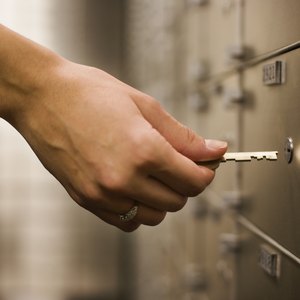
You can store personal possessions, legal documents, jewelry and even cash in a bank safe deposit box. When a bank becomes insolvent or goes bankrupt, the Federal Deposit Insurance Corporation shuts down the bank’s operations and seizes control of its assets. The contents of a safe deposit box are not at risk in any way during the closure of a bankrupt bank. However, you may have limited access to the contents of your box for a period of time.
Closing Process
FDIC regulators make regular visits to banks that are close to becoming insolvent. Technically, a bank becomes insolvent when its liabilities exceed its assets. FDIC regulators attempt to work with the directors of the bank to resolve its financial issues. If the FDIC cannot prevent the bank from becoming insolvent, it forces the bank to cease operations. This occurs after the bank has closed for the day so as to not cause disruption to account holders. Bank employees finish processing the day's transactions and thereafter the bank becomes the property of the FDIC.
The Aftermath
Generally, banks that have been closed down by the FDIC reopen the next day as normal, which means you have uninterrupted access to your safe deposit box. In most instances, the same bank employees who previously helped you access your box in the past remain on staff as employees of the now FDIC-owned bank. Therefore, you may not even realize that your bank has been shut down. The FDIC usually attempts to broker a deal to sell a failed bank to another financial institution within a day or two of the closure. If that occurs, the name of the bank may change, but its operations continue as normal.
Limited Access
In theory, the FDIC may shut down the bank only to find that no other institutions are willing to buy its assets or assume control of its branches. In a situation such as this, the FDIC may not have the manpower to keep the bank operating as normal. The branches may not open for business, in which case you will not be able to access your safe deposit box. If this situation occurs, the FDIC must contact you by mail and give you specific instructions as to when and how you can retrieve the contents of your safe deposit box. To avoid any delay, ensure that your bank always has your correct contact information on file.
FDIC Insurance
Some people choose to keep cash in their safe deposit boxes. Although banks discourage this practice due to federal laws that forbid financial institutions from helping tax evaders hide money, no state or federal laws actually prohibit the depositing of cash into safe deposit boxes. However, funds held in a safe deposit box are not covered by FDIC insurance. Additionally, bank insurance policies that cover damage to property held in safe deposit boxes do not extend to provide coverage to cash held in a box.
Read More: Safety Deposit Box Rules
References
Resources

